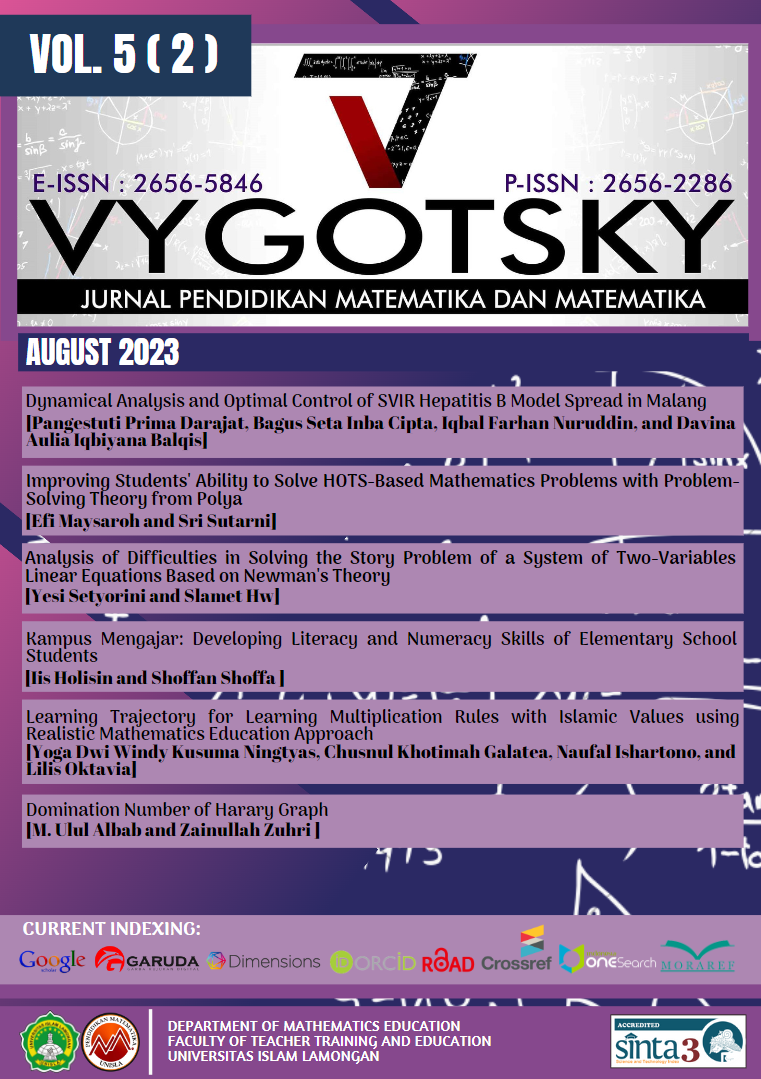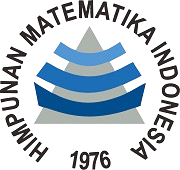Learning Trajectory for Learning Multiplication Rules with Islamic Values using Realistic Mathematics Education Approach
DOI:
https://doi.org/10.30736/voj.v5i2.835Keywords:
RME, LT, multiplication rules, design researchAbstract
This paper aims to investigate how a learning trajectory (LT) of multiplication rules support students in developing their understanding and reasoning skills. The learning activities in LT are developed by using Realistic Mathematics Education approach with Islamic values embedded. This study employed design research, which involved a cyclical process of preliminary design, experimental design, and retrospective analysis. The data were collected from 30 tenth-grade students an Islamic senior high school in Jember, Indonesia. The data collected from literature reviews, observations, interviews, videotaping, and tests. The results depicted that the LT of multiplication rules based realistic-Islamic context can support students’ thinking and reasoning about the concepts of multiplication rules. Most notably, the Islamic content and context may teach good deeds and principles that may be applied to students’ daily life.Downloads
References
Abdussakir. (2017). Internalisasi nilai-nilai islami dalam pembelajaran matematika dengan strategi analogi. Seminar Nasional Integrasi Matematika Dan Nilai Islami, 1(1), 1–15. http://conferences.uin-malang.ac.id/index.php/SIMANIS/article/view/546
Afriansyah, E. A., & Arwadi, F. (2021). Learning Trajectory of Quadrilateral Applying Realistic Mathematics Education: Origami-Based Tasks. Mathematics Teaching Research Journal, 13(4), 42–78.
Bakker, A., & Van Eerde, D. (2013). An introduction to design- based research with an example from statistics education. In A. Bikner- Ahsbahs, C. Knipping, & N. Presmeg (2013), Doing qualitative research: methodology and methods in mathematics education. In Freudental Institute for Science and Mathematics Education (Issue September). https://doi.org/10.1007/978-94-017-9181-6
Clements, D. H., & Sarama, J. (2014). Learning trajectories. Learning over Time: Learning Trajectories in Mathematics Education, 1–30.
Cobb, P., Confrey, J., DiSessa, A., Lehrer, R., & Schauble, L. (2003). Design experiments in educational research. Educational Researcher, 32(1), 9–13.
Elizondo-RamÃrez, R., & Hernández-SolÃs, A. (2017). Hypothetical Learning Trajectories that use Digital Technology to Tackle an Optimization problem. International Journal for Technology in Mathematics Education, 24(2).
Fauzan, A., Plomp, T., & Gravemeijer, K. (2013). The development of an RME-based geometrycourse for Indonesian primary schools. In T. Plomp, & Nieveen (Eds). Educational Design Research - Part B Illustrative Cases, 2013, 159–178.
Gravemeijer, K. P. E. (1994). Developing realistic mathematics education. Faculty of Sciences, Freudenthal Institute, 13(3), 200 pp. http://www.cdbeta.uu.nl/tdb/fulltext/199503-terwel2.pdf%0Ahttp://www.fisme.science.uu.nl/toepassingen/20014/
Gravemeijer, Koeno; Cobb, P. (2013). Design Research from the Learning Design Perspective. In T. Plomp & N. Nieveen (Eds.), Educational design research - Part A: Introduction (pp. 72–113). SLO. https://doi.org/10.1007/978-1-4614-3185-5_11
Hadi, S. (2017). Realistic Mathematics Education: Theory, Development and Implementation. Jakarta: PT Raja Grafindo Persada.
Hendriana, H., Prahmana, R. C. I., & Hidayat, W. (2019). The Innovation of Learning Trajectory on Multiplication Operations for Rural Area Students in Indonesia. Journal on Mathematics Education, 10(3), 397–408.
Heuvel-panhuizen, M. Van Den, & Drijvers, P. (2014). Realistic Mathematics Education. In S. Leman (Ed.), Encyclopedia of Mathematics Education (pp. 521–525). Springer. https://doi.org/10.1007/978-94-007-4978-8
Irawan, A., & Kencanawaty, G. (2017). Implementasi pembelajaran matematika realistik berbasis etnomatematika. Journal of Medives: Journal of Mathematics Education IKIP Veteran Semarang, 1(2), 74–81.
Isandespha, I. N. (2015). Pengembangan bahan ajar materi pembelajaran matematika sd dengan pendekatan realistik bernuansa islami untuk mahasiswa pendidikan guru sekolah dasar. Elementary School: Jurnal Pendidikan Dan Pembelajaran Ke-SD-An, 2(1).
Johnson, E. B. (2002). Contextual teaching and learning: What it is and why it’s here to stay. Corwin Press.
Kuntowijoyo, M. T. M. (2001). Esai-Esai Agama. Budaya, Dan Politik Dalam Bingkai Strukturalisme Transendental, Bandung: Mizan.
Liljekvist, I., Mellroth, E., Ollson, J., & Boesen, J. (2016). Proc. MADIF10 Development of mathematics teaching: design, scale, effects. SMDF Linköping.
Maryati, Iyam; Priatna, N. (2017). Integrasi Nilai-Nilai Karakter Matematika Melalui Pembelajaran Kontekstual. Mosharafa, 6(September), 333–344.
Muslimin, Indra Putri, R. I., Zulkardi, & Aisyah, N. (2020). Learning integers with realistic mathematics education approach based on islamic values. Journal on Mathematics Education, 11(3), 363–384. https://doi.org/10.22342/JME.11.3.11721.363-384
Nieveen, Nienke; McKenney, Susan; van den Akker, J. (2006). Educational Design Research: The Value of Variety. In N. van den Akker, Jan; Gravemeijer, Koeno; McKenney, Susan; Nieveen (Ed.), Educational Design Research (1st Editio, Issue 10 August 2006, pp. 229–240). Routledge.
Nihayati, Suningsih, A., & Abdullah, H. M. (2018). Integrasi Ayat-Ayat Bilangan Dalam Al- Qur ’ an Dengan Nilai-Nilai Islam. UIN Raden Intan Lampung, 03(02), 101–109.
Ningtyas, Y. D. W. K., Maharani, Y. Y., & Anjarsari, E. (2022). THE HYPOTHETICAL LEARNING TRAJECTORY OF ENUMERATION RULES WITH ISLAMIC VALUES. JPMI (Jurnal Pendidikan Matematika Indonesia), 7(2), 96–104.
Plomp, T. (2013). Educational design research: An introduction. Educational Design Research, 11–50.
Prahmana, R. C. I. (2017). Design Research:(Teori dan Implementasinya: Suatu Pengantar).
Putri, R. I. I., & Aisyah, N. (2020). Learning Integers with Realistic Mathematics Education Approach Based on Islamic Values. Journal on Mathematics Education, 11(3), 363–384.
Rahman, B., Abdurrahman, A., Kadaryanto, B., & Rusminto, N. E. (2015). Teacher-based scaffolding as a teacher professional development program in Indonesia. Australian Journal of Teacher Education, 40(11), 66–78. https://doi.org/10.14221/ajte.2015v40n11.4
Risdiyanti, I., Prahmana, R. C. I., & Shahrill, M. (2019). The learning trajectory of social arithmetic using an indonesian traditional game. Elementary Education Online, 18(4), 2094–2108. https://doi.org/10.17051/ilkonline.2019.639439
Salafudin, S. (2015). Pembelajaran Matematika Yang Bermuatan Nilai Islam. Jurnal Penelitian, 12(2), 223. https://doi.org/10.28918/jupe.v12i2.651
Sembiring, R. K., Hadi, S., & Dolk, M. (2008). Reforming mathematics learning in Indonesian classrooms through RME. ZDM, 40, 927–939.
Treffers, A. (2012). Three dimensions: A model of goal and theory description in mathematics instruction—The Wiskobas Project (Vol. 3). Springer Science & Business Media.
Van den Heuvel-Panhuizen, M., & Drijvers, P. (2020). Realistic mathematics education. Encyclopedia of Mathematics Education, 713–717.
van Galen, F., Feijs, E., Figueiredo, N., Gravemeijer, K., van Herpen, E., & Keijzer, R. (2008). Core insights into percentages. In Fractions, Percentages, Decimals and Proportions (pp. 89–105). Brill.
Zulkardi. (2002). Developing A Learning Environment On Realistic Mathematics Education For Indonesian Student Teacher (Doctoral disertation) [University of Twente]. https://repository.unsri.ac.id/6353/1/thesis_Zulkardi.pdf
Zulkardi, Z., Putri, R. I. I., & Wijaya, A. (2020). Two decades of realistic mathematics education in Indonesia. International Reflections on the Netherlands Didactics of Mathematics: Visions on and Experiences with Realistic Mathematics Education, 325–340.
Downloads
Additional Files
Published
How to Cite
Issue
Section
License
Copyright:
Authors who publish their manuscripts in this Journal agree to the following conditions:
- Copyright of any article on Vygotsky: Jurnal Pendidikan Matematika dan Matematika is held solely by the author under the Creative Commons Attribution 4.0 International license (CC BY NC SA).
- Authors can submit papers separately, arrange non-exclusive distribution of manuscripts that have been published in this journal into other versions (e.g. sending to the author's institutional repository, publication in a book, etc.) by acknowledging that the manuscript has been published for the first time in Vygotsky: Jurnal Pendidikan Matematika dan Matematika.
License:
Vygotsky: Jurnal Pendidikan Matematika dan Matematika is published under the terms of the Creative Commons Attribution 4.0 International License (CC BY NC SA). This license permits anyone to copy and redistribute this material in any form or format, compile, modify and develop this material for any purpose as long as it is not for commercial purposes. Additionally, anyone must provide credit and distribute contributions under the license of the creator of the original work.











